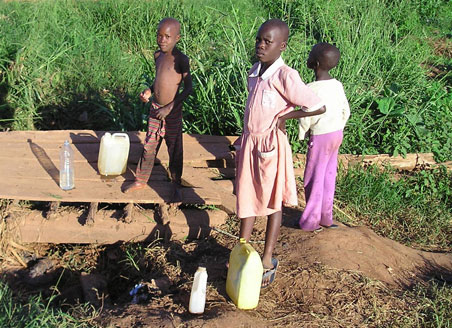Brighton has won a £41,500 grant from UNICEF to clean up water for Malawi.
Published on July 6, 2011 at 2:43 PM by FACE OF MALAWI
 The University of Brighton has won a £41,500 grant from UNICEF to help clean up drinking water for millions of people in Malawi.
The University of Brighton has won a £41,500 grant from UNICEF to help clean up drinking water for millions of people in Malawi.
The biggest challenge facing children in Africa is reaching the age of five, according to the World Health Organisation, and contaminated water is one of the leading causes of child mortality.
UNICEF, which provides emergency food and healthcare to children around the world, has asked the university’s Aquatic Research Centre to investigate the problem in rural areas of Malawi.
Dr Huw Taylor of the School of Environment and Technology, and colleagues, senior lecturer Dr James Ebdon and researcher Richard Phillips, will work with the University of Malawi in providing expertise in water microbiology and in the design of water safety plans to support the long term provision of safe water in villages.
Dr Taylor, project leader, said: “We have realised for some time that the expertise we have in the Aquatic Research Centre can support the UN Millennium Development Goal of reducing by half the number of people lacking access to safe drinking water in developing countries.
“We have much to learn from our partners at the University of Malawi and we are very much looking forward to the challenges of this project.
“To me, access to clean drinking water is a basic human right and helping people gain that access is the reason I got into the field of water pollution research in the first place. Ever since I gained my degree in microbiology, this issue has driven my research ambitions.”
The team will report next year, and its recommendations are expected to help the Malawian government provide a greater proportion of its 14 million population with safe drinking water, and thereby help to reduce infant mortality rates in the country.
Dr Taylor stressed: “This is very much a collaboration with the University of Malawi and its Centre for Water, Sanitation, Health and Appropriate Technology Department (WASHTED). Its director, Dr Geoffrey Chavula, played the key role in writing the successful proposal to UNICEF.”
WASHTED was established in 2003 to improve water and sanitation provision which, according to the Malawi health indicators, are among the worst in the world: Water supply coverage in the country is 32 per cent in rural areas and sanitation is adequate for only six per cent of Malawians.
Dr Taylor said: “This sort of activity demonstrates how the university’s social engagement agenda stretches further afield than just the South East of England, and also demonstrates the clear impact of our research.”
Source : The University of Brighton


